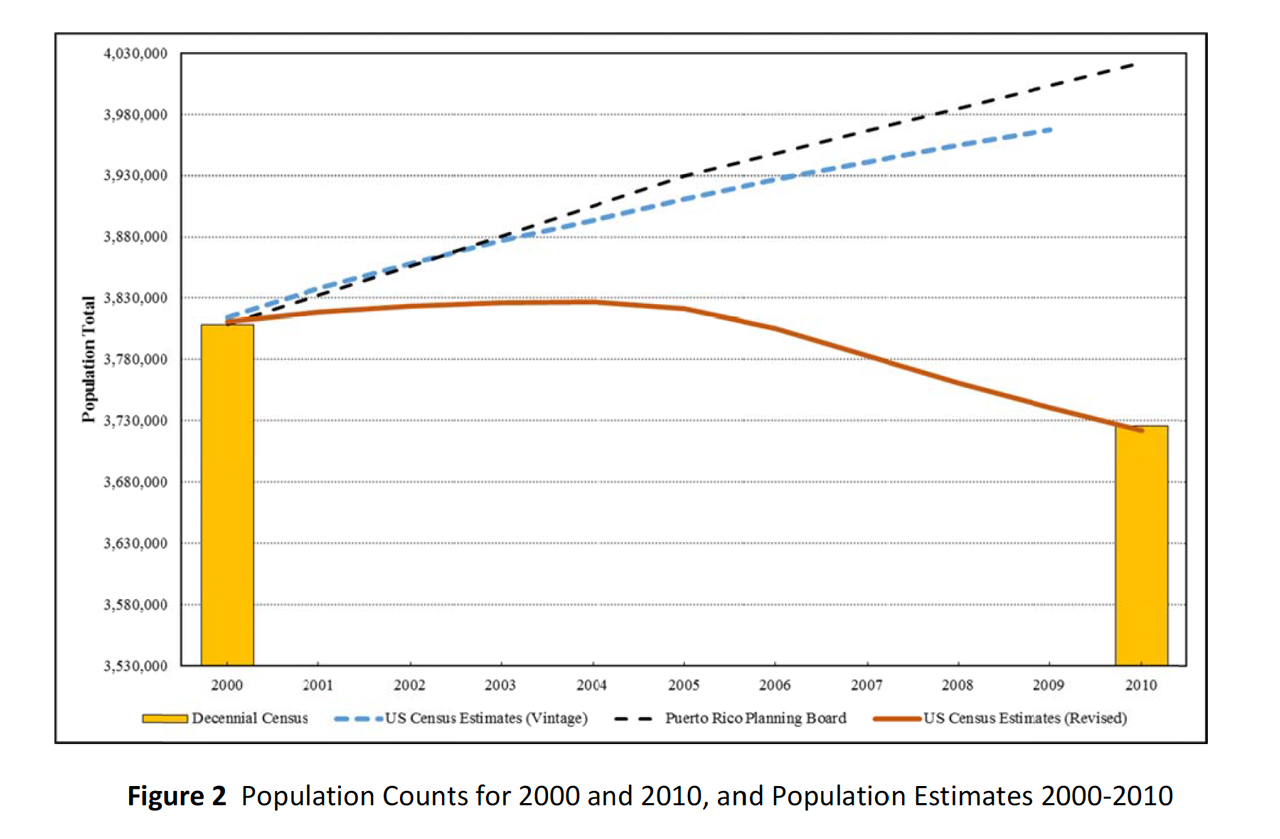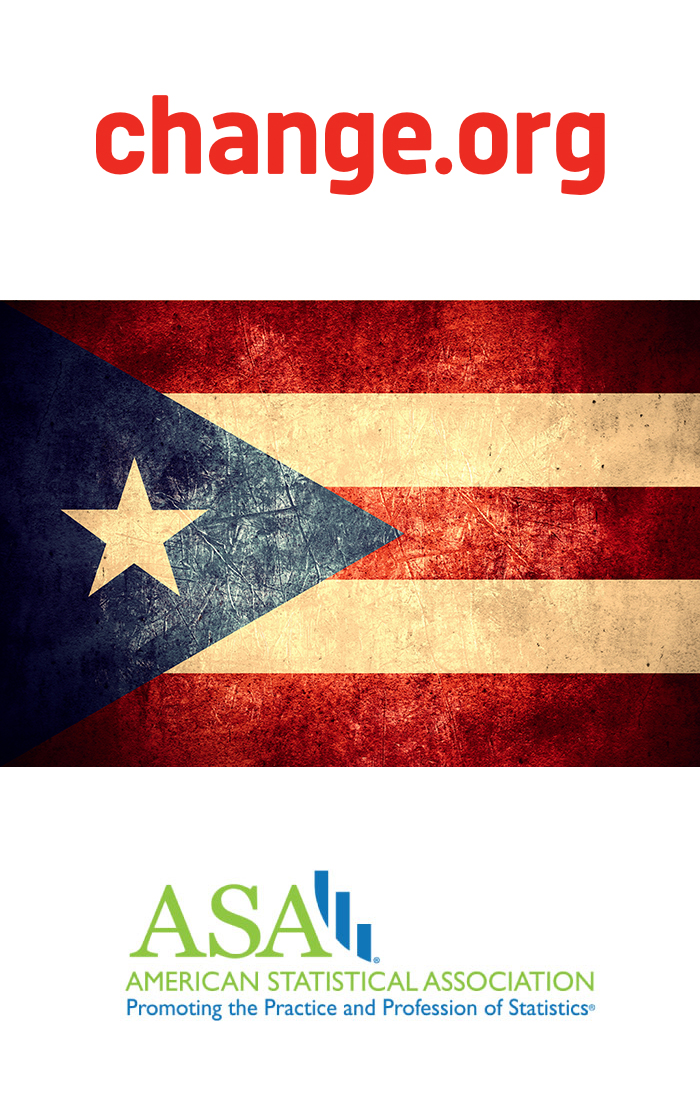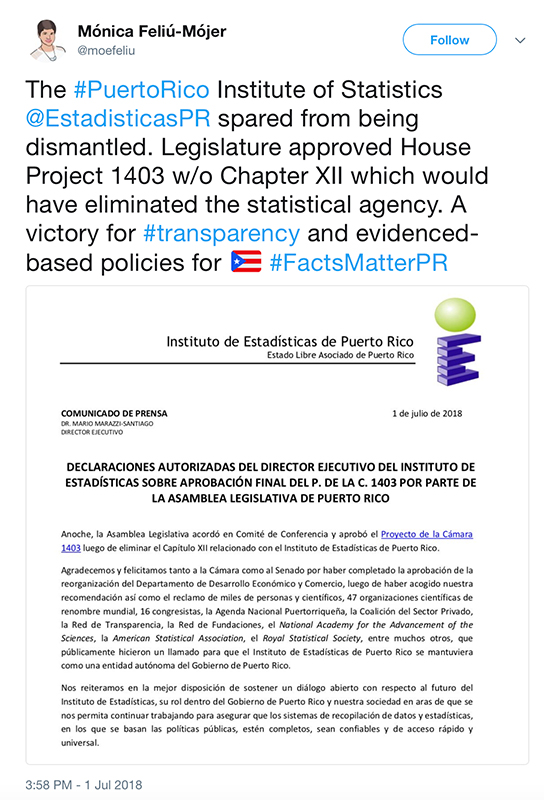How to wreck
save Puerto Rico
After saving Puerto Rico hundreds of
millions of dollars, a world-class
statistics institute faces
has been saved from destruction
Trevor Butterworth
Photo: cestes001 for istockphoto.com
“Why would you not want an independent and unbiased entity producing and revising the data that you need to be trusted by your citizens and federal entities?”
—Carla Minet, Executive director of the Center for Investigative Journalism, Puerto Rico
Join the American Statistical Association in petitioning Governor Rosselló and the Puerto Rico Legislature to save PRIS.
Update, July 2, 2018. After a long campaign to save Puerto Rico’s independent statistics institute from being dissolved, with increasing news coverage warning of the impending catastrophe such a loss would bring, Puerto Rico’s legislature voted to save PRIS. Hurrah!
If you wanted to wreck a country, slowly and subtly from within, it is hard to think of a better strategy than breaking its ability to collect reliable data about itself. Economic forecasting would become unreliable, thereby undermining business confidence and investment; social and infrastructural policy–from education to health to welfare–would stumble through miscounting; problems would be misunderstood, policies would be misdirected, citizens and policymakers alike would be confounded in their ability to make decisions based on evidence. And, of course, the opportunities for political manipulation would be endless: if no one is independently measuring economic and social performance and problems, there is no independent accounting of incompetence and failure or effectiveness and success.
It is a measure of how basic reliable national statistics are to a country’s well-being that the literature on governance doesn’t treat the idea that you mightn’t want or need reliable statistics seriously. Ignorance might be bliss, but it’s rarely so in practice. When Britain downsized official statistics in the 1980s, treating them as the government’s and not the public’s business, the result was pronounced a disaster by no less than the political party that presided over the experiment. As Norman Lamont, Britain’s Conservative Chancellor of the Exchequer, dryly explained in 1992, “There is no doubt in my mind that weaknesses and gaps in Britain’s statistics have made the task of economic management more difficult.”
Official statistics might be best thought of as the Socratic injunction to “know one’s self” writ to the outlines of a national border; and one of the dominant themes in research is that any national self-diagnosis should come from an independent body, so that every citizen can trust that the data has been collected and analyzed as completely and objectively as possible, and according to internationally-agreed upon methodologies. Professional independence inspires public confidence.
Having now stated what to many is obvious, it is now time to state what should be absurd: Puerto Rico, battered by two brutal hurricanes and over a decade of recession is planning to dismantle the independent Puerto Rican Institute of Statistics (PRIS), despite its analyses having saved the territory hundreds of millions of dollars. Official statistics under the new government reorganization will be privatized—and commissioned through Puerto Rico’s Department of Economic Development and Commerce.
To understand why this is a terrible idea, says Alexis Raúl Santos, Director of the Graduate Program in Applied Demography at Penn State, you need to remember what things were like in Puerto Rico before 2007—when PRIS opened its doors. Data collection was haphazard, figures from one government department didn’t cohere with those from another, and there was no public way of accessing any of it. The hunt for basic statistical data on anything going on in Puerto Rico required researchers to know the right person in the right government department, and then hope that they would provide access.
The institute, staffed by highly qualified academics with backgrounds in epidemiology, education, and statistics, changed all this: PRIS imposed quality control, harmonized data across departments, and provided open access to reports, “so that anyone could see them, from researchers to my mom,” says Santos.
The research projects PRIS initiated or provided assistance to showed the extent to which Puerto Rico had been data blind: the number of Puerto Ricans in residential care had been radically undercounted, population growth had been wildly over-estimated, the Consumer Price Index miscalculated (with Puerto Ricans paying more for everyday items), and there were $120 million dollars of Medicare and Medicaid payments that needed to be recovered because of flawed record keeping. PRIS also developed a series of new indexes to understand and measure development and various literacies, including knowledge of science and technology, all of which were critical to knowing how to improve the territory’s economic and social well-being.
The perils of misestimating population growth
On the basis of estimates by the US Census and the Puerto Rico Planning Board, the territory anticipated its population growing to around four million by 2009-2010. As a consequence, Puerto Rico’s government assigned resources to educational infrastructure, borrowed money through bonds, and issued permits for housing developments. By the 2010 census, it was clear that the population had not only not grown (and provided the tax revenue to support the infrastructural expansion), it had declined; 30,000 houses were vacant. Subsequent analysis found a decline in childbirth and an increase in migration behind the decline.
—THE POPULATION DECLINE OF PUERTO RICO: AN APPLICATION OF PROSPECTIVE TRENDS IN COHORT-COMPONENT PROJECTIONS, Alexis R. Santos Lozada and Alberto L. Velázquez Estrada, SERIE DE DOCUMENTOS DE TRABAJO Working Paper Series Vol. 2015-1 / Octubre 2015

It was able to do all this successfully because, in addition to its official independence, PRIS’s Executive Director, Mario Marazzi-Santiago, an economist with degrees from Harvard, the London School of Economics, and Cornell who had previously worked at the Federal Reserve in Washington DC, was given quasi-judicial powers to enforce data access. PRIS became a powerful advocate for transparency in government, helping the media gain access to information, says Carla Minet, Executive director of the Center for Investigative Journalism in Puerto Rico, via email. And while efforts to create a local equivalent to a freedom of information act failed, “PRIS has been an important source of data for journalists,” she says, “not only providing reliable datasets and support for understanding them, but also as a consultant and referral for other sources of information.”
Though underfunded relative to the scale of its task with a budget around $2 million a year ($3 million a year less than the law mandating the Institute’s creation stipulated), PRIS has become a world class institution, something that Puerto Rico should be immensely proud of and grateful for. It democratized data instead of playing politics with the numbers. Uniquely for Puerto Rico, it had an independently appointed board of directors, despite being part of the executive branch of government. And that’s why, say observers, it ran afoul of Puerto Rico’s political culture.
First, in 2010, there was an attempt to remove Marazzi-Santiago over his demand that the Labor Department publish the Consumer Price Index; then, last year, Governor Ricardo Rosselló Nevares dismissed four members of the Institute’s seven independently appointed board of directors, a move that was declared “null and illegal” in early March of this year by Puerto Rico’s Superior Court after an appeal by Marazzi-Santiago.
But the real shock for Americans must surely be the Puerto Rico government’s handling of the death toll from Hurricane Maria. Instead of working with PRIS, the Department of Public Safety went at it alone, and insisted that its figure—64 deaths as of December 29—was the official death toll. An analysis by Santos, with data independently supplied by PRIS, showed that the excess death for September and October—the number of people dying this year compared to the same months in previous years—was 25 percent higher, meaning an additional 1,085 people had died, almost all probably due to the effects of the hurricane. Recent data, provided by PRIS indicates that the total deaths for November are 6.4% higher than the expected average.
These numbers are higher than earlier estimates by CNN, Puerto Rico’s Center for Investigative Journalism, and the New York Times, with the estimate for November suggesting that relief efforts were not equal to the scale of the crisis. Indeed, the scale of the discrepancy between the real and the official figures led the government to promise an independent review of the death toll. But instead of going to PRIS or even working with PRIS, the government announced that a team from Milken Institute School of Public Health at George Washington University would do the review at a cost of at least $1.4 million. Roberto Rivera, a statistician at the University of Puerto Rico, Mayaguez points out that no-one knows how or why this team was chosen, but that opposition politicians quickly focused on Rosselló Nevares father, Pedro, as having taught at the same school.
On the face of it, excluding a national statistics office from collecting mortality data makes no sense; but then, why would PRIS be involved when the government intends to end its existence as quickly as possible? “It’s been one of the main areas of criticism [of Puerto Rico], that we don’t have verifiable and good statistics,” Rosselló Nevares, recently told Science magazine about the reorganization plan. “Let’s just fix it by consolidating all of these data-driven entities into one, and then let’s take it completely out of local government for it to be managed.”
As Santos notes, this literally doesn’t make sense. PRIS isn’t broken, it’s just underfunded and ignored by the current ruling party; moreover, it is already external and independent. Under the Governor’s plan, statistics will be beholden to whichever political party is running the Economic Development and Commerce department. “Why would you not want an independent and unbiased entity producing and revising the data that you need to be trusted by your citizens and federal entities?” asks Minet. “The governor’s claim, unfortunately, seems to be motivated by the eagerness to control PRIS politically, and it raises lots of red flags and questions. If you surveyed citizens, the press, federal agencies, and even many Puerto Rico government agencies about what should the government do with PRIS, they would all agree that it should be given more resources to do more.”
“Both main political parties prefer to place ‘people of confidence’ as heads of main offices,” explains Rivera. He also dismisses the argument that dismantling PRIS will save the cash-strapped government money, noting that PRIS has saved Puerto Rico sums vastly greater than its cost; besides, he says, “data based decision making is not a luxury.”
The view from Washington DC is that, whatever the government’s motivations or aspirations, dismantling PRIS looks like a really bad idea. On February 8, Sen Elizabeth Warren wrote to the U.S. Government’s Office of Budget and Management (OMB) to voice her concerns, noting that the privatization of PRIS “contradicts recommendations from a bipartisan Congressional Task Force on Economic Growth in Puerto Rico, which stated that PRIS should ‘continue to protect its independence’ from political influence.” On February 2, a bipartisan group of 15 members of the House wrote to the OMB (cc’ing Rosselló Nevares) with similar concerns, and pointing out that PRIS had been “a key ally of the federal statistical agencies as a highly professional, autonomous, and apolitical organization.”
Part of the problem is that as a territory and not a state, Puerto Rico does not fall under the jurisdiction of federal statistical monitoring, even as it is obligated to provide those agencies with reliable data. It has to go it alone. But a broader and more problematic issue, according to Rivera is that politicians and the public just don’t understand the value of good official statistics. “People respect Marazzi for his genuine willingness to make things better, [and for] putting politics aside,” he says, “But many do not appreciate the value of making decisions based on empirical data.” People are also mentally exhausted, he says, by the combination of the recession, the hurricanes and their seemingly endless impact, and the scale of the government’s reorganization plan, which seeks to implement many far-reaching changes, from establishing charter schools to privatizing the power company to dismantling the tourist board. It’s hard to find the bandwidth to understand what is at stake with PRIS and its staff of 12, let alone rally against it. “The people,” says Rivera, “are overwhelmed.”
“I am concerned that an institution that has given so much to the population of Puerto Rico will disappear,” says Santos, “and we will go back to a model where data is a commodity.” In fact, he says, the future may be worse than the past, noting the territory’s disastrous history of privatization, the subject of his masters’ thesis. Where is the guarantee that a private company will provide objective data when its contract comes through political patronage, he asks? “If the government loses control of our data,” says Santos, “we are lost.”



Trackbacks/Pingbacks